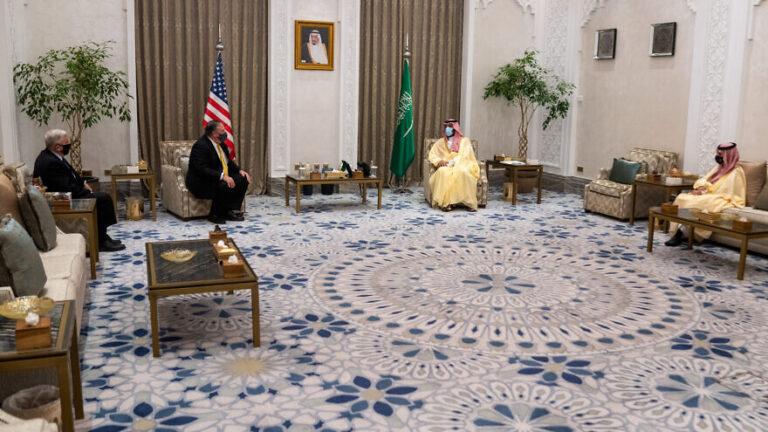Biden Inherits West Asia’s Grapes of Wrath

Crown Prince Mohammed bin Salman (R) received US Secretary of State Mike Pompeo, Neom, Saudi Arabia, Nov. 22, 2020
On the arid landscape of the Arabian deserts, the outgoing US president Donald Trump and his son-in-law Jared Kushner planted a sapling called the Abraham Accords last August. They forecast it to be the harbinger of a future vineyard of luscious grapes, richly satisfying and arousing desire, which they hoped to harvest after securing their mandate to rule America for another four years.
But God willed otherwise. The sapling now becomes the inheritance of the Joe Biden presidency, which Trump tried to throttle in its cradle. It is now up to Biden to water his predecessor’s sapling, manure it and protect it from insects and desert storms, leave alone create a vineyard out of it. But Biden’s dilemma will be that Trump’s sapling can only bear grapes of wrath.
Trump and Kushner had estimated that they had an understanding with Saudi Arabia’s young Crown Prince Mohammed bin Salman (MbS) for the kingdom to laterally enter the Abraham Accords. But there are disquieting signals that MbS instead chose to await the outcome of the November 3 election in the US, which, of course, Trump lost.
Trump, who is known to despise ‘losers’ ought to have anticipated that the Saudis would see him in a different light today. But he persisted and deputed his most trusted Secretary of State Mike Pompeo to travel to Saudi Arabia, in consultation with Israeli Prime Minister Benjamin Netanyahu, as to how to nudge MbS out of his inertia.
Pompeo and Netanyahu decided to undertake a joint mission to meet the Crown Prince. It was a tricky mission, no doubt, since there would be great sensitivity over someone like Netanyahu setting foot on the soil where the two holiest mosques of Islam are located.
However, it turned out to be an unproductive mission anyway. MbS balked. Various accounts of the secret meeting at Neom, Saudi Arabia’s Red Sea resort, on November 22 have since leaked out. They all suggest that the Saudi priorities are no more the same as they used to be.
Succinctly put, Riyadh has apparently concluded that there is currently a lot of work to do to get back into the incoming US president’s good books and it requires single-minded attention. Unsurprisingly, MbS is treading carefully.
Atrocities linked back to the Saudis in Yemen, the murder of journalist Jamal Khashoggi, the human rights situation in Saudi Arabia, etc. have cemented Biden’s perception of the kingdom as a “pariah” state. MbS has stressed that instigating a war with Iran as soon as Biden is about to take power will not be a smart thing to do.
Meanwhile, there are other signals too that Saudi Arabia hopes to change course in its regional policies. Certainly, King Salman’s phone call to Turkish President Recep Erdogan on November 20 seeking reconciliation, Saudi overtures to normalise relations with Qatar, the painstaking efforts to project Saudi “soft power” during the recent G20 summit — all these are nascent signs of a Saudi course correction.
At the core of this course correction is MbS’ closeness to the UAE Crown Prince Mohammed bin Zayed (MbZ), who of course works in direct affiliation with the US and Israeli intelligence. The general perception in the region and internationally is that MbZ has MbS in the palm of his hand as a sort of “useful fool.”
Indeed, such a perception grew steadily over time. MbZ was most certainly instrumental in dragging Saudi Arabia into the war in Yemen, instigating Saudi Arabia’s rupture with Qatar (the only other Muslim country with a Wahhabi religious establishment), and the souring of ties with Turkey.
It is hard to tell whether the reading of Turkish analysts is correct or not — namely, that MbZ has Saudi Arabia wrapped around his finger and he manipulates MbS to serve the Emirati and Israeli interests. But such an estimation seems plausible.
At any rate, King Salman’s overture to Erdogan and Sheikh Tamim bin Hamad al-Thani, the Emir of Qatar, would not have been to the liking of MbZ for whom these two countries are sworn enemies who mentor the Muslim Brotherhood, and, more importantly, are challenging his ambitious path to place the UAE as the number one regional power in the Muslim Middle East.
On Erdogan’s part, he suspects the UAE’s role in the failed coup attempt in 2016 to overthrow and eliminate him. Turkey takes serious note of the Emirati support of Kurdish separatists. Again, Turkey and the UAE are in conflict in Syria and Libya.
Nonetheless, Erdogan welcomed King Salman’s overture and hopes that it would lead to a Saudi-Turkey normalisation. But he also realises that everything depends on MbS stepping out of the UAE-Israeli orbit and Saudi Arabia finally getting its act together in its own interests.
No doubt, Trump’s exit brings about a paradigm change. Trump had empowered MbS to the extent the latter could literally get away with murder. But from January 20 onward, the Pottery Barn Rule will become applicable — ‘If you break it, you fix it.’
Traces of the Saudi rethink appeared at MbS’ meeting with Pompeo and Netanyahu. The US-Israeli entreaties during the meeting at Neom — principally, that Saudi Arabia should follow the UAE’s footfalls and join the Abraham Accords and as quid pro quo, Israel would pull strings in the Beltway to mitigate Biden’s antipathy toward the Saudi regime — didn’t have the desired outcome.
The US state department readout on the Neom meeting simply said, “They (Pompeo and MbS) discussed the need for Gulf unity to counter Iran’s aggressive behaviour in the region and the need to achieve a political solution to the conflict in Yemen.”
MbS acted wisely by holding back on the “Gulf unity” call Pompeo espoused and Netanyahu desired, which was, plainly put, a metaphor to attack Iran. MbS would know that if Trump proceeds to attack Iran in terms of a Israeli-Emirati-Saudi script, Saudi Arabia will not get US protection from Biden.
Saudi Arabia finds itself in a tight spot. MbS is apprehensive that the Biden Administration will be hostile toward him and make him accountable for past mistakes such as the murder of Khashoggi, and it may lethally destroy his claim to succeed King Salman. Already, there is opposition to him from within the House of Saud and some of those elements also enjoy western backing.
It is in such a complex scenario that Trump is deputing Koshner to meet MbS this week to make one final attempt to persuade the latter to fall in line. In reality, Koshner is acting on Netanyahu’s behest. Koshner is reputed to wield influence on MbS at a personal level.
The stakes are very high for all sides — for Israel and the UAE, in particular. Without Saudi Arabia entering the Israeli tent, Abraham Accords remains weak and unstable, and like many such Middle Eastern accords in history that were born in ecstasy, like the Oslo accord and the Camp David agreement, the fizz may go out of it once the godfather in the White House retires on January 20.
Biden has big decisions to make regarding the Middle East situation. With the signing of the Abraham Accords, Israel has entered the cockpit of the US regional strategy, which historically pitted the Sunni Arab regimes of the Persian Gulf against Iran. Whereas, Biden plans to negotiate with Iran.
Again, Israel lives by the sword and its ascendance in the Persian Gulf is sure recipe for seamless strife and bloodshed for years to come. Does Israel make a good ally for the US in these circumstances? Put differently, why should the US allow Israel to continue to dictate its Middle East policies?
Finally, Saudi Arabia is a regional heavyweight and Biden’s upcoming presidency could force Riyadh into a more pragmatic foreign policy by ending the Gulf crisis. Without doubt, Biden reining in on MbS would be a decisive factor.
But then, Riyadh also faces pressure from the UAE, which does not want any Saudi reconciliation with Qatar and Turkey. Yet, the intriguing part is that Biden has harshly criticised Saudi Arabia many a time, but is largely turning a blind eye on the UAE despite its expanding record of military interventions in most Middle Eastern hotspots.
Get the latest reports & analysis with people's perspective on Protests, movements & deep analytical videos, discussions of the current affairs in your Telegram app. Subscribe to NewsClick's Telegram channel & get Real-Time updates on stories, as they get published on our website.
























